Behind this news lies a major global trend in property investment.
On September 15, China’s State Administration of Foreign Exchange announced streamlined procedures for foreign individuals to exchange funds for property purchases within China.
This means that foreign nationals meeting real estate purchase eligibility requirements can now exchange funds at banks based on their purchase contracts first, followed by submitting required documentation later. While seemingly a technical adjustment, it sends a clear signal to the market: China is attempting to attract more foreign capital into its real estate sector through capital account liberalization, aiming to shore up the property market.
This news not only concerns China but also reflects a global trend: cross-border property investment.
When property markets cool, exchange rates fluctuate, and immigration and education needs intersect, buying a home is no longer merely about “having a place to live.” It becomes a strategic choice involving identity, wealth management, educational resources, and future living arrangements.
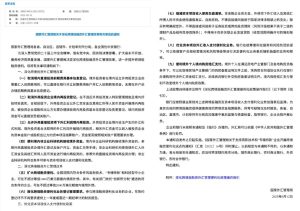
Source: CN Foreign Exchange Administration

I. China Eases Foreign Exchange Settlement for Overseas Property Purchases by Individuals:
What signals does this send?
1. Three key points from the China News Service report:
Removal of restrictions: Capital account income is no longer prohibited from being used to purchase non-self-occupied residential properties.
Streamlined process: Permits advance foreign exchange settlement using purchase contracts, with supplementary documentation required afterward.
Macro Context: Amid a cooling property market with consecutive price declines and accelerating investment contraction, foreign capital is urgently needed to stabilize the sector.
2. This policy signals two underlying messages:
China’s more open stance toward foreign investment: By lowering capital utilization barriers, it aims to attract overseas individuals and institutions into the property market.
Foreign capital is viewed as a potential “fresh injection”: Amid weak domestic demand, overseas buyers may be relied upon to stabilize the market.
However, China’s property market still imposes restrictions such as purchase eligibility requirements, purchase limits, and loan restrictions. Therefore, large-scale liberalization for overseas individuals remains unlikely. Consequently, high-net-worth individuals and cross-border families will continue to look toward overseas property investments.

Source: China News Service, China News Network

II. Singapore: Property as More Than an Asset—
A “Ticket” to Social Mobility
1. Singapore’s Tax Barriers for Property Purchase
According to data from Singapore’s Lianhe Zaobao and Ministry of Finance, effective April 27, 2023, the Additional Buyer’s Stamp Duty (ABSD) for foreign buyers surged from 30% to 60%.
Example: For a S$2 million private residential property, the ABSD alone amounts to S$1.2 million.
This has prompted reactions of “ridiculously expensive,” yet it underscores:
Singapore discourages property speculation, using high taxes to deter short-term flippers.
Genuine buyers primarily seek status and long-term planning, not arbitrage.
By contrast, Singapore citizens and PRs enjoy significantly better treatment:
Citizens purchasing their first home: Exempt from ABSD.
PRs purchasing their first home: Only 5% ABSD required.
Citizens purchasing a second home: 20%, third home: 30%.
PRs purchasing a second home: 30%, third home: 35%.
The conclusion is clear: Singapore PR status = the ultimate “money-saving voucher.”
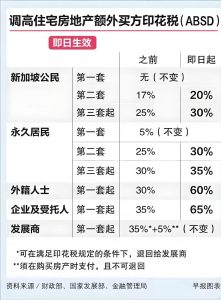
Source: Lianhe Zaobao
2. The Logic of Property Purchase Tied to Status
In Singapore, buying property isn’t just an investment—it’s about establishing roots:
Foreigners can only purchase limited private residential units and face steep ABSD rates.
PRs enjoy near-citizen treatment for property purchases and may even qualify for government subsidies.
Citizens and PRs also receive annual transfer grants from the Ministry of Finance (S$7,825 per person in 2024).
This signifies that property ownership in Singapore acts as a catalyst for status elevation. Want to buy a home? Securing PR status first proves more advantageous.
3. Urban Livability and Investment Value
A Knight Frank and Ipsos survey reveals:
57% of respondents are satisfied with housing, while 18% are “very satisfied.”
Over 40% express satisfaction with recreational facilities.
The primary concern is rising living costs.
In other words, while Singapore’s real estate market is expensive, it remains perceived as stable, secure, and livable. Amid global political and economic uncertainty, “a Singapore property equals a form of identity and risk-hedging insurance.”
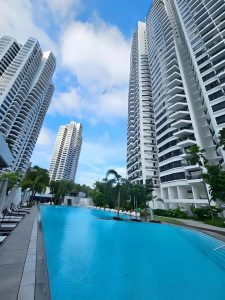
Source: Internet

III. United States:
Three Key Advantages of the World’s Largest Real Estate Market
1. Low Barriers to Entry for Global Buyers
Compared to Singapore, U.S. real estate is more open to foreigners:
Foreign buyers face virtually no barriers—regardless of visa status, they can purchase property in the U.S.
No punitive taxes like the ABSD exist.
After purchase, owners can freely rent or sell properties, with legal protection of property rights.
2. Educational and Immigration “Bonus Points”
While buying property in the U.S. doesn’t directly grant a green card, it offers several practical advantages:
Property ownership helps demonstrate financial stability and residency intent during visa applications.
The school district where the property is located directly impacts children’s educational resources. Premium school district properties in the U.S. are consistently in high demand and demonstrate strong price resilience.
Investor visas (EB-5) and asset verification often require proof of property ownership.
3. Investment Value and Rental Returns
The U.S. real estate market is vast and diverse:
Major international cities like New York and Los Angeles offer strong property value retention.
Regions like Texas and Florida experience rapid population growth, yielding substantial rental yields.
According to OECD data, the U.S. still outperforms most Asian nations in per capita living space and the housing price-to-income ratio.
In summary, the advantages of buying property in the U.S. include: high liquidity, low entry barriers, and access to educational resources.

Source: Internet

IV. Buying Property in Small Nations = A Shortcut to Immigration?
Beyond Singapore and the U.S., many small nations/islands market “property-for-residency” programs to attract global high-net-worth individuals.
1. Mediterranean Trio: Malta, Cyprus, Greece
Greece Golden Visa: Purchase property starting at €250,000 for long-term residency.
Malta: Property investment or government bond purchases grant permanent residency or citizenship with favorable tax policies.
Cyprus (previously popular, now tightened): Previously offered permanent residency for €350,000 property purchases.
2. Caribbean Island Nations: St. Kitts, Dominica, Grenada
Invest in real estate starting at $200,000 to obtain citizenship.
No worldwide taxation, with visa-free access to over 150 countries.
Ideal for tax planning and children’s education.
3. Southeast Asian Neighbors: Malaysia’s “My Second Home Program” (MM2H)
Long-term residency granted through fixed deposits + property purchase.
Housing costs lower than Singapore with reduced living expenses, but subject to significant political and currency volatility.
Summary: Small-country property purchases excel in “low barriers + rapid status acquisition,” yet suffer from poor liquidity. Primarily serve as immigration and tax tools rather than pure investments.
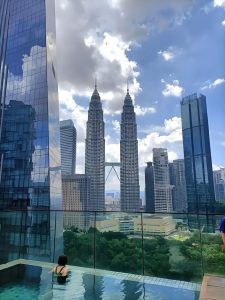
Image source: Internet

V. Global Comparison:
Who Should Buy Where?
China Property Purchase: Policies are easing but remain restrictive, suitable for families with genuine housing needs and mainland development plans.
Singapore Property Purchase: Expensive but stable and secure, ideal for families seeking residency status, educational resources, and asset protection.
US Property Purchase: Low barriers, high school district value, suitable for families pursuing asset allocation and educational resources.
Small Country Property: A fast-track to immigration, suitable for tax planning or those needing a “second identity.”
One-Sentence Summary:
Want security and status? Go to Singapore.
Want asset allocation and education? Go to the U.S.
Want low barriers and a passport? Go to a small country.
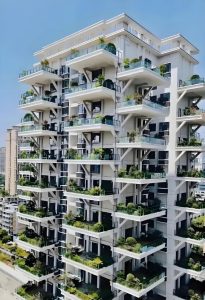
Image Source: Internet
Conclusion: Buying property is no longer just about “purchasing a house”
From China’s streamlined property access for foreign buyers to Singapore’s high stamp duties, America’s open market, and small nations’ investment immigration programs—we observe a common trend: property transcends mere assets, becoming a lever for identity and wealth management in a globalized landscape.
Whether prioritizing education, taxation, citizenship, or asset allocation, one question remains:
Are you purchasing a home—or a future?
Note: References sourced from China News Service, China News Network, Singapore’s MND, MOF, MAS, HDB, URA, Lianhe Zaobao, and compiled from comprehensive news reports. Reproduction requires attribution; contact for removal if infringing….
